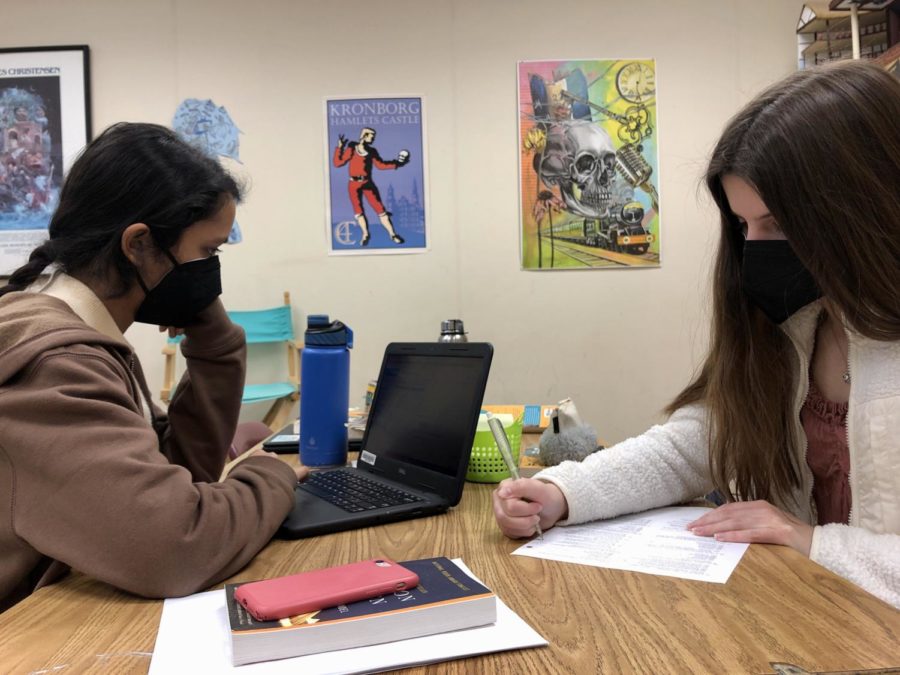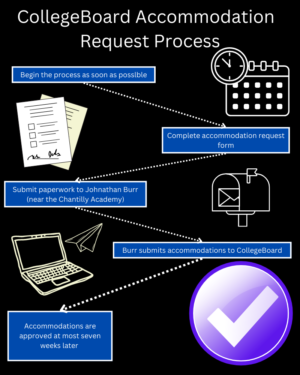FCPS works to make the grade for digital AP exams
Senior Srija Upadhyay works on a multiple choice practice on AP Classroom as senior Anna Dimaiuta annotates a reading passage on paper.
May 1, 2023
Scantron or computer, pencil or keyboard. These are the perpetual debates that trouble every test-taker, even more so following the College Board’s announcement of an in-school digital testing option for AP exams, leading to speculations regarding the upcoming testing season.
The digital option is available to schools in the 48 contiguous states and Washington, D.C. Seven AP subjects are available in digital format this year: Computer Science Principles, English Language and Composition, English Literature and Composition, European History, Seminar, U.S. History and World History: Modern.
“If it’s mainly multiple choice, I prefer paper and pencil because it’s easier to mark up the paper,” senior AP student Srija Upadhyay said. “But if I’m writing an essay, I type a lot faster than I can write, so I would prefer a digital exam.”
Multiple staff members of Fairfax County Public Schools (FCPS), including tech support specialists, AP testing coordinators and staff from the Office of Advanced Academics, evaluated whether the county has the technology and infrastructure needed to administer the digital AP testing smoothly this year, according to high school educational specialist for advanced academic programs Rebecca Small. After evaluation, FCPS decided on March 13 that Herndon High School will pilot all the digital exams this year, as they are the only school that has the infrastructure needed to support digital AP testing for all seven available subjects. All the other schools will only administer AP Seminar and AP European History in the digital format.
“I think [the county’s decision] actually helps this year, because it takes away that uncertainty of students sitting for an electronic exam in a building and then all of a sudden, the electricity goes out,” social studies teacher Charles Koch, who teaches AP Seminar, said. “The decision the county has made is the right decision for this year, because it takes away that uncertain element that creates stress for students, exam administrators, everyone.”
Some of the challenges of implementing digital testing in all FCPS schools include a lack of sufficient electricity in large testing spaces to provide outlets to all students during the exam. Additionally, some testing spaces do not have stable Wi-Fi to support digital AP testing on a greater scale, which is required to access and submit the digital exams.
“As part of understanding the infrastructure needs for large scale digital AP tests moving forward, having [Herndon High School] pilot the digital AP tests in 2023 will benefit the division moving forward,” Small said via email.
According to the College Board, digital exams will be administered on Bluebook, an online testing platform that is already used for international SATs this year. Digital exams will include the same sections, number and choice of questions and timing as the paper exams. The College Board will apply a psychometric equating and linking process to make sure that all exams have comparable and equitable results, regardless of format. Still, some students have concerns regarding both digital and paper-pencil exams being graded under the same standard.
“Each student takes a test differently,” Upadhyay said. “Some people might do better online, some people might do better on paper. There are already disparities, and just grading people the same way when they are taking [the exams] in two different ways would not seem fair to me.”
FCPS departments and offices will continue to work together to assess digital AP testing readiness, and hope to make necessary upgrades to the infrastructures in large testing spaces so that all schools may access digital AP testing in the next school year, according to Small.
“I think within the next two to three years, all exams will be taken digitally,” Koch said. “I think now they’ve identified what the issues are, what the impediments are to giving them now, they have time to work on it.”





